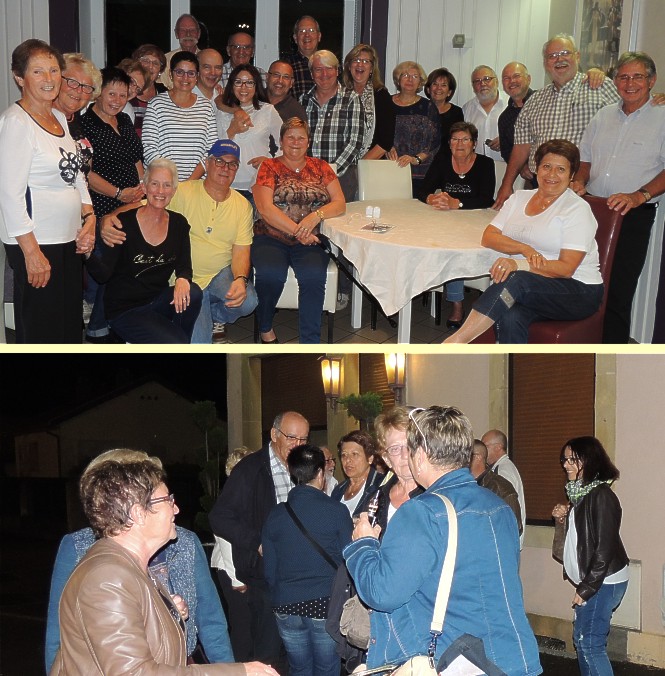Kansas Snapshots by Gloria Freeland - October 7, 2016
Friends who can't say "au revoir"
Fourteen years ago, I wrote “The family that can’t say goodbye” about my Freeland relatives. I have a picture of Grandpa
Freeland leaning on a relative’s car, sharing a few last words before they parted. The rest of us are the same, following
visitors to their vehicles while exchanging last-minute thoughts and later waving to them until those vehicles disappear from
sight.
Husband Art, friends Charlotte and Brent Rundell and I witnessed something very similar this past week. Brent, as the mayor of Morganville,
Kansas, was with us in France as part of the re-connection with Morganville’s sister city of Fèves. The relationship was initiated in 1948 when
Fèves was recovering from the effects of World War II and Morganville was sending aid.
The situation is very different 68 years later. Fèves has a bustling commercial area that provides a good tax base for the
growing village. But as American farms grow larger and the number of farmers dwindle, the need for small farming communities is waning.
Fewer farmers and ranchers means less business for small-town merchants. And with better roads, those who live in rural areas think
nothing of driving to a community 20 or more miles away to buy whatever they need. Yet while Morganville has certainly felt these effects, it has
been able to avoid becoming the ghost town that has been the fate of so many other such communities.
A week ago Tuesday, Fèves Mayor René Girard presided over the official reception for Brent and Charlotte at the village’s
community center. A slide show displayed events of the past six-plus decades. The mayors exchanged gifts and said the kind of things mayors say on such occasions. And
being France, the wine and champagne flowed freely.
But as the evening drew to a close, many of the Fèves citizens reminded us that we would be seeing them again on Friday. They were referring to
a dinner organized by a group of citizens who call their organization “Bien Vivre a Fèves,” which roughly translates into “Live well in Fèves.”
The French have a reputation for knowing and enjoying good food. Our friend Francis quoted the expression that best describes the situation:
“Most people eat to live; the French live to eat.” Unlike American restaurants where profits rest on low prices and getting as many people herded
in and out as quickly as possible, many French restaurants open late and expect only one party will use a table that evening. The food is prepared
fresh and there is ample time between courses to cultivate good conversation. So it was not surprising that we were looking forward to a great
evening.
We arrived at the restaurant in the small village of St. Privat just west of Fèves about 8 p.m. Unlike in the U.S. where we
usually greet friends with a quick “Hi,” every man shakes the hand of every other man present. The women are greeted by a
kiss on both cheeks by every woman and every man ... I could get used to that!
This sort of welcome is a bit hard to negotiate over a table, so it all took place outside the restaurant. Then we went inside and each person
selected a place along the two long tables that formed a large L.
The food course began with a before-dinner drink and freshly baked rolls ... and talk.
Then each of us selected one of three wines to accompany the introductory course. Art went straight for the robust Bordeaux
that he favors, while many went for a lighter Burgundy with the intention of moving on to the Bordeaux with the main course.
And, of course, we talked more.
At each point, the owner introduced what would be coming next and what our options would be. But since I am not fluent in French, I
had to trust my instincts and the advice of Francis and others on the wines.
And, of course, there was more talk!
While the main course was based on the meat of the humble chicken, the duck-liver sauce which bathed it could best be
described as “to die for.”
And it was all seasoned with more conversation.
Soon, the wine took hold and we were feeling no pain. The woman next to Art pulled him against her cheek for a picture and our friend
Gérard said to her, “Sophie, I think you have found your man.” Christophe brought his hat - a gift from the people of Morganville - for the four of
us to sign. Brent entertained the French near him with the help of his cell phone’s translation program, hoping it was doing a reasonable job. I
was surprised my poor French was understood when I said I had two daughters who teach.
Dessert was served and it was not like anything I had experienced before - a layered creation of ice cream or sorbet, whipped cream, a bit of
crunchy meringue and a raspberry drizzle - again, something “to die for.”
Then it was on to the after-dinner drinks ... and more talk.
With the clock fast approaching midnight, we gathered for several pictures and then sang “Auld Lang Syne.” This was largely rendered in French,
but we Americans stuck with English. Everyone cheered when Art sang a second verse.
After each and every person said “au revoir” to every other person in the same manner we had said “hello,” we began heading
for the door.
But no one seemed in a hurry to leave. So “goodbyes” were repeated outside the restaurant. After a few minutes, Francis,
tongue in cheek, said, “Maybe we could all go somewhere, have a drink and say 'goodbye' yet again.”
We all laughed, but agreed with regret that it was time for the friends who cannot say “au revoir” to do just that.
